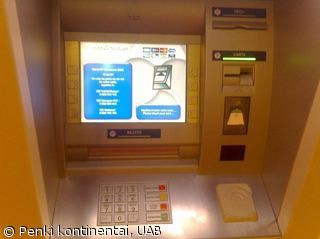Ruse uses e-mail, Web site to snag account numbers and personal identification numbers
Published:
27 December 2003 y., Saturday
Security experts are warning of a new Internet scam that preys on Visa credit card holders, using e-mail and a specially designed Web site to harvest customer account numbers and personal identification numbers.
The ruse is the latest example of so-called "phisher" scams and comes as one e-mail security company reports incidents of such scams, which use decoy Web pages and spam e-mail messages to trick unsuspecting users into divulging sensitive information, are up 400 percent this holiday season.
Visa International Inc. did not respond to requests for comment.
The new phisher came to light after Internet users began receiving e-mail messages purportedly coming from "Visa International Service." The messages claimed that Visa had implemented a new "security system to help you to avoid possible fraud actions" and asked users to click a link to "reactivate your account," according to messages posted in Full-Disclosure, an online discussion list frequented by computer security experts.
The message contained a Web link that appeared to direct users to www.visa.com, Visa International's official Web site.
However, security experts who looked at the HTML (Hypertext Markup Language) message's source code discovered that the link really directed users to a Web page at an Internet address that does not belong to Visa, according to messages posted on Full-Disclosure.
The Web site has since been taken down.
E-mail security company Tumbleweed Communications Corp. said on Tuesday that reports of e-mail fraud and phishing scams are up 400 percent this holiday period.
Tumbleweed based its findings on reports of scam attacks submitted to anti-phishing.org, a Web site run by the Anti-Phishing Working Group, an industry group that Tumbleweed helped found, the company said in a statement.
Šaltinis:
infoworld.com
Copying, publishing, announcing any information from the News.lt portal without written permission of News.lt editorial office is prohibited.
The most popular articles
Software company announced new structure_ of it_s business.
more »
 Networking sites like Facebook and YouTube are changing politics.
more »
Networking sites like Facebook and YouTube are changing politics.
more »
 Vendor to service almost 4,000 existing ATMs and supply another 450.
more »
Vendor to service almost 4,000 existing ATMs and supply another 450.
more »
 The advent of deposit automation, facilitated in many ways by the implementation of Check 21, is not only improving check-handling processes at the self-service terminal – it also is improving handling within the bank branch itself.
more »
The advent of deposit automation, facilitated in many ways by the implementation of Check 21, is not only improving check-handling processes at the self-service terminal – it also is improving handling within the bank branch itself.
more »
 The Moroccan Post Office, Barid Al-Maghrib, has selected Bull to act as project manager on the automation project for its International Mail Center in Casablanca.
more »
The Moroccan Post Office, Barid Al-Maghrib, has selected Bull to act as project manager on the automation project for its International Mail Center in Casablanca.
more »
 Gemalto has taken home one of the most coveted technology prizes in Austin with its Smart Enterprise Guardian (SEG).
more »
Gemalto has taken home one of the most coveted technology prizes in Austin with its Smart Enterprise Guardian (SEG).
more »
 Banks in Australia are rushing to install gas detectors into their ATMs, as gas-explosive attacks on ATMs in the country continue to climb.
more »
Banks in Australia are rushing to install gas detectors into their ATMs, as gas-explosive attacks on ATMs in the country continue to climb.
more »
 EMC CEO Joe Tucci and Microsoft CEO Steve Ballmer showcase deep technology collaboration at New York CIO Summit.
more »
EMC CEO Joe Tucci and Microsoft CEO Steve Ballmer showcase deep technology collaboration at New York CIO Summit.
more »
 India-based mChek looks to offer its secured SIM-card-based mobile applications through partnership with Gemalto.
more »
India-based mChek looks to offer its secured SIM-card-based mobile applications through partnership with Gemalto.
more »
 Nearly one week after news emerged of the big data breach at Princeton, N.J.-based merchant acquirer Heartland Payment Systems Inc., it remains unclear how much damage actually happened and who did it.
more »
Nearly one week after news emerged of the big data breach at Princeton, N.J.-based merchant acquirer Heartland Payment Systems Inc., it remains unclear how much damage actually happened and who did it.
more »
 Wincor Nixdorf AG has announced the release of an enhanced security product for bank branches called ProTect.
more »
Wincor Nixdorf AG has announced the release of an enhanced security product for bank branches called ProTect.
more »